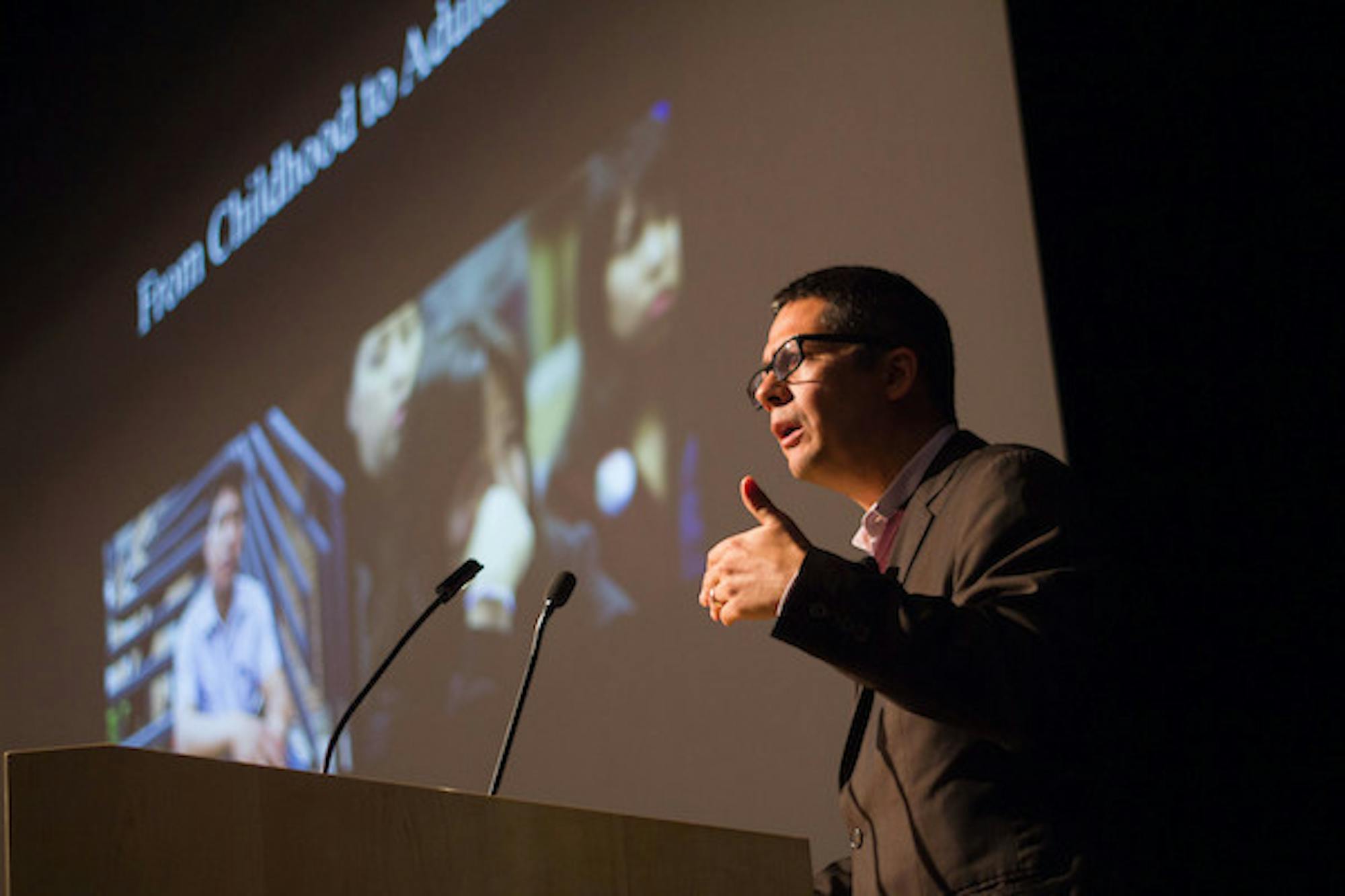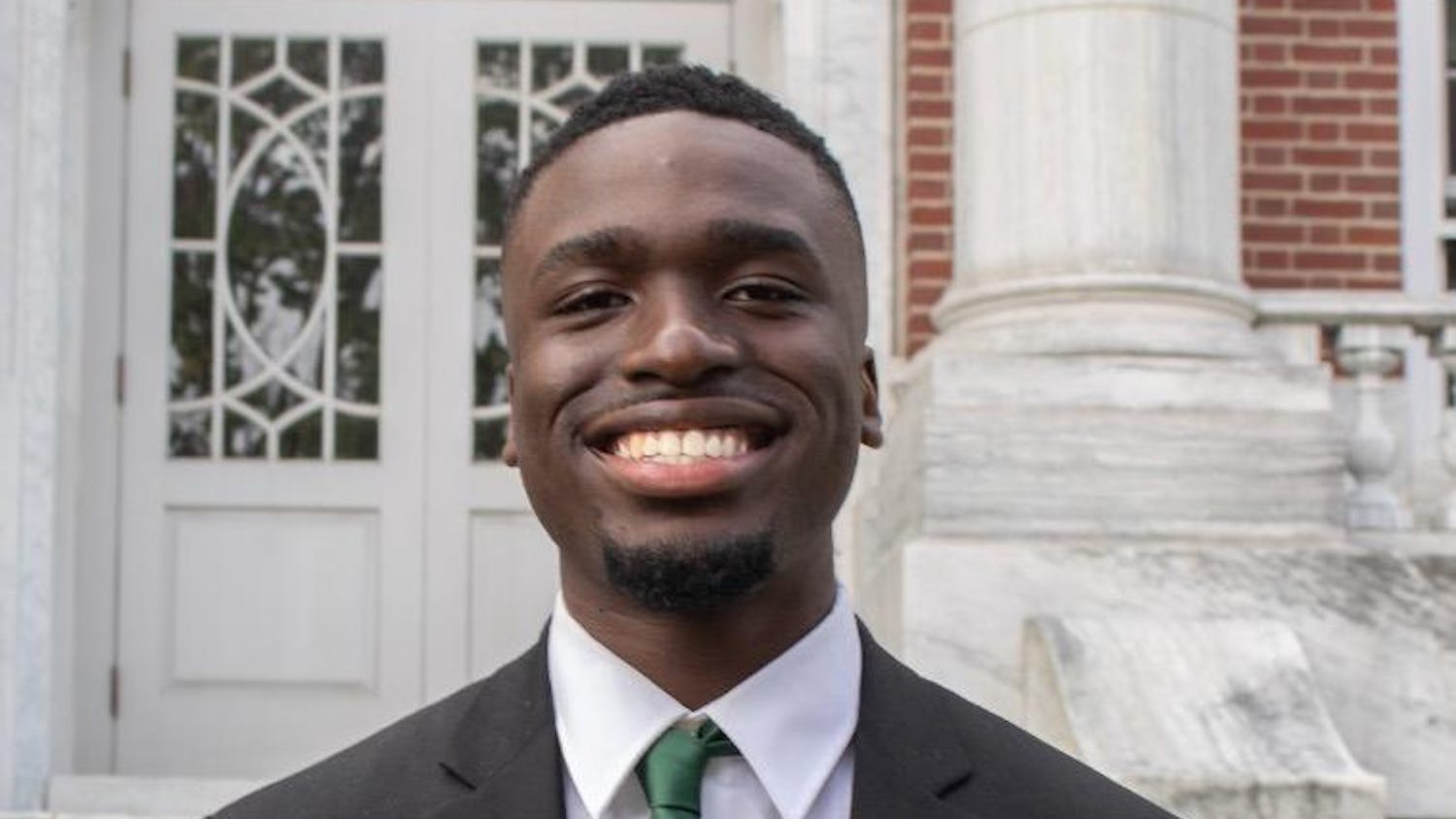Roberto Gonzales, author of this year’s Common Reading Book "Lives in Limbo: Undocumented and Coming of Age in America," gave a lecture at Cohen Auditorium at 6:30 p.m. on Oct. 6. The lecture was co-sponsored by the Office of the Dean of Undergraduate and Graduate Students and the Jonathan M. Tisch College of Civic Life.
Gonzales, an assistant professor at the Harvard Graduate School of Education, was introduced by Dean of Undergraduate and Graduate Studies John Barker and Senior Director of Tisch Programs at the Tisch College Mindy Nierenberg.
“The program serves as an introduction into your new intellectual community,” Barker said, addressing the first-years in the audience.
Nierenberg explained that the issue of immigration is important to every person, undocumented or otherwise.
“Immigration policy in this country affects not only those whose lives are in limbo but every single one of us that cares about justice and human rights,” she said.
Gonzales began the lecture by discussing his first job after college, for which he worked closely with undocumented families. He spoke about Alex, an undocumented immigrant who arrived in the United States with his family at the age of four.
According to Gonzales, Alex was a talented artist with the potential to attend a private art high school. Gonzales and other community members took Alex’s portfolio to an admissions officer but were told that he would not be admitted because he was an undocumented immigrant.
“One by one by one, barriers were erected in front of Alex,” Gonzales said.
Gonzales explained that Alex enrolled in the local public school, where he continued to face challenges -- he was unable to get a driver’s license or apply for a job -- before dropping out during his first year.
Alex’s family had not been able to change their immigration status due in large part to the decades-long inaction of Congress, Gonzales said.
“Our politicians like to say that change takes time … [Historically,] progressive change has taken years, if not decades,” he said. “These ideas are often debated at the 30,000-foot-level, away from the lived experiences."
Meanwhile, these young people and their families have to wait, Gonzales said.
Gonzales noted that the discussion of undocumented people by politicians and in the media typically centers around workers, but in reality, it is a much wider issue. Increasing security at the southern border has made crossing more difficult, which means that migrants have started bringing their families, Gonzales said.
According to Gonzales, the Plyler decision ruled that states could not deny undocumented children access to education, although these protections did not extend beyond k-12 education or life after school.
Gonzales explained that immigrant children grow up integrated into the k-12 education system, which he described as a very powerful, defining American institution.
With each passing year, the children’s culture becomes closer to that of their classmates instead of their parents. However, each year brings them closer to their parents’ lived reality, Gonzales said -- they are unable to work legally, vote or receive financial aid.
“Our laws treat children and adults differently, but they don’t account for the continuity of children becoming adults,” Gonzales said.
In a slideshow presentation, Gonzales spoke of the stigma and embarrassment that children feel about their undocumented immigrant status.
“This is not something that middle school and high school children are talking about on the playground with their peers,” Gonzales said.
Some students have “dramatic awakenings” when they find out about their undocumented status. Others are aware from a young age, but this knowledge does not become salient until matched with other experiences of exclusion, such as being unable to drive and thus less able to attend social events.
Gonzales shared several stories about the undocumented students he has worked with. These included that of Sergio, who was eventually deported but managed to return, as well as Esperanza, who had to look on as her friends were admitted into colleges.
“So how do we think beyond big policy?” Gonzales asked. “How do we think about local-level solutions?”
Gonzales ended the lecture by challenging the audience to move the conversation forward at Tufts.
According to Associate Dean for Student Success and Advising Robert Mack, the Office of Undergraduate Admissions at Tufts does not consider applicants’ immigration status when reviewing applications.
“Undocumented students, with or without Deferred Action for Childhood Arrivals (DACA), who apply to Tufts are treated identically to any other U.S. citizen or permanent resident in their high school,” Mack, who also chairs the common reading committee, told the Daily in an email.
Every year, incoming first-year and transfer students receive a copy of the Common Reading Book, which Mack says students are encouraged, but not required, to read.
Mack said that "Lives in Limbo," which delves into the issues of undocumented immigrant children in Los Angeles, was chosen for the Common Reading Program with the upcoming presidential election in mind.
Like other recent Common Reading Books such as "Whistling Vivaldi" by Claude Steele and "Acts of Faith" by Eboo Patel, "Lost in Limbo" addresses a social issue. This trend is intentional, according to Nierenberg.
“One of the [Common Reading Program] criteria is that the book has to be connected to civic life,” Nierenberg said. “[We want] students thinking about their place in the world and how they can affect positive change.”
Mack agreed that the book is meant to give students a better understanding of the world around them and a better grasp of increasingly pertinent issues.
“[Gonzales’] book provides a unique perspective that educates, informs, and enraptures its readers in a way that we all leave the book with a better perspective on the impossible situation of undocumented immigrants, especially young undocumented immigrants in America,” Mack said. “Tufts’ core values include a commitment to equal opportunity, inclusion, accessibility, and diversity.”
“[T]his book will help us to become better informed and passionate about the subject of immigration reform,” Mack said. “'Lives in Limbo' is a great accompaniment to the conversations for immigration reform and acceptance that we are having at Tufts.”
Roberto Gonzales gives Common Reading Program lecture






